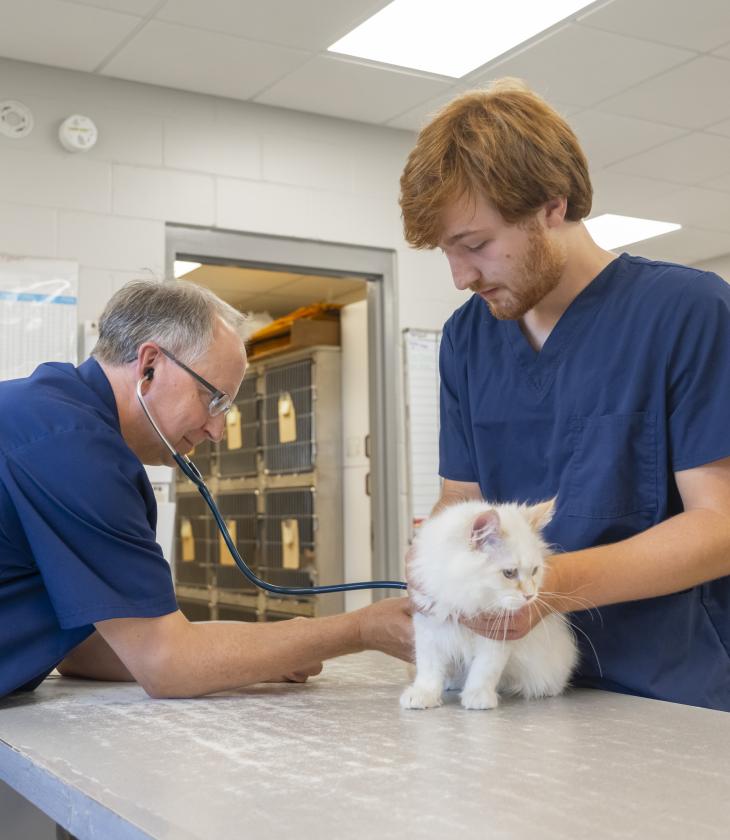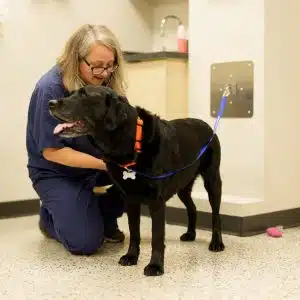Key questions your Board Certified Veterinary Oncologist on your first appointment
Comprehensive Overview to the Providers Offered by a Vet Oncologist
Vet oncology incorporates a vast array of services focused on diagnosing and treating cancer in pet dogs. Veterinary Cancer Specialist. Oncologists utilize advanced diagnostic methods and use different treatment choices customized to each pet's needs. They additionally focus on helpful care and supply important resources for pet dog proprietors. Recognizing these services is important for making educated decisions. What certain elements of veterinary oncology can significantly impact an animal's treatment trip?
Comprehending Veterinary Oncology
Vet oncology is a specialized field concentrated on dealing with and diagnosing cancer cells in pets. This technique encompasses a large range of techniques, from medical therapies such as radiation treatment and immunotherapy to surgical treatments focused on getting rid of lumps. Veterinary oncologists are trained to acknowledge the special manifestations of cancer in numerous types, allowing them to customize treatment strategies to private people.
In addition to traditional therapies, veterinary oncology stresses encouraging treatment, which plays an important function in improving the lifestyle for damaged pets. This consists of discomfort monitoring, dietary assistance, and palliative care choices. Partnership with animal proprietors is vital, as they are important to decision-making concerning their family pets' treatment paths. As research study breakthroughs, vet oncology proceeds to develop, providing new hope and enhanced results for family pets identified with cancer. On the whole, this area is essential for attending to the intricacies of cancer in friend pets.
Advanced Diagnostic Techniques
Advanced diagnostic techniques play a crucial role in vet oncology, supplying critical insights into the existence and extent of cancer in pets. Imaging techniques such as ultrasound, CT scans, and MRI are commonly used to picture growths and analyze their attributes. In addition, biopsy treatments are necessary for obtaining cells samples, enabling conclusive medical diagnosis and tailored therapy plans.
Imaging Modalities Utilized
Imaging methods play a necessary role in the medical diagnosis and management of cancer in pets. Veterinary oncologists make use of various innovative imaging techniques to examine growth metastasis, dimension, and presence. Radiography, or X-rays, offers an initial view of bone and chest problems, while ultrasound provides real-time imaging of soft tissues, permitting for detailed analysis of internal organs. Calculated tomography (CT) enhances visualization of complex physiological structures and allows 3D reconstructions, assisting in precise growth localization. Magnetic vibration imaging (MRI) is important for soft tissue distinction, particularly in brain growths. In addition, nuclear medication techniques such as positron emission tomography (ANIMAL) help determine metabolic activity within growths. Jointly, these methods boost analysis precision, assisting effective treatment techniques for oncological individuals.
Biopsy Treatments Explained
Adhering to the first analysis via imaging methods, obtaining a clear-cut diagnosis typically needs tissue sampling through biopsy procedures. Veterinary oncologists use different biopsy techniques based on the tumor's location and characteristics. Great needle aspiration (FNA) is a minimally intrusive approach that extracts cells for cytological evaluation, ideal for superficial masses. Core needle biopsies provide bigger cells samples and work for much deeper lumps, permitting histopathological evaluation. Surgical biopsies include excising a section or the entire tumor, assisting in complete examination. These procedures not only verify the presence of cancer cells yet likewise help establish its kind and grade, guiding therapy choices. Each biopsy method is selected meticulously to balance analysis precision with client safety and convenience.
Therapy Options for Cancer Cells in Animals
When a pet is identified with cancer, a range of treatment alternatives appear to help enhance and take care of the disease high quality of life. Vet oncologists usually suggest a multidisciplinary approach customized to the specific pet's requirements, which might include surgical treatment, radiation therapy, immunotherapy, or different treatments.
Surgery is commonly used to remove growths and affected tissues, possibly bring about complete remission in some situations. Radiation treatment intends to target and damage cancer cells, minimizing lump dimension and reducing signs - Veterinary Cancer Specialist. Immunotherapy uses the pet's immune system to combat cancer better, while different therapies may consist of acupuncture or natural supplements to sustain general health and wellness
Each therapy choice lugs its own benefits and risks, and vet oncologists function closely with animal owners to create a thorough strategy that aligns with the pet's specific medical diagnosis and the proprietor's dreams. The best objective is to enhance the pet's convenience and lifestyle throughout their cancer cells trip.
Chemotherapy for Animals
Chemotherapy is a typical treatment option for pets detected with cancer cells and is usually used along with other treatments laid out by veterinary oncologists. This treatment entails the management of specific drugs made to target and damage cancer cells, thereby reducing lump dimension and stopping the spread of the condition. Vet oncologists tailor radiation treatment procedures based on the sort of cancer, the pet dog's general health, and the wanted treatment end result.
Adverse effects can happen, as these drugs might likewise influence healthy cells. Usual reactions consist of nausea or vomiting, vomiting, and site temporary modifications in appetite - Veterinary Oncology Services. Veterinary oncologists are furnished to take care of these adverse effects effectively, making sure the pet's comfort throughout the therapy process. Regular surveillance through blood examinations and follow-up appointments is necessary to assess the family pet's response to radiation treatment and make necessary modifications. Ultimately, chemotherapy can offer substantial benefits, boosting the quality of life for family pets encountering cancer diagnoses

Radiation Therapy in Vet Medicine
Radiation treatment works as an effective therapy option for pet dogs diagnosed with local growths, offering a targeted technique to cancer administration. This technique uses high-energy radiation to damage the DNA of cancer cells, inhibiting their capacity to proliferate. It is especially advantageous for lumps that are not amenable to surgical elimination or for cases where surgical procedure may not be practical due to the growth's area.
Veterinary oncologists customize radiation protocols based on lump type, place, and dimension, as well as the animal's total health. Therapy can be provided through outside light beam radiation or brachytherapy, each with distinct advantages. Normally, numerous sessions are called for to take full advantage of performance while minimizing negative effects.
Although family pets might experience temporary reactions such as skin inflammation, the general aim is to shrink tumors and ease signs and symptoms, inevitably boosting the family pet's diagnosis and quality of life. As necessary, radiation treatment plays an essential duty in thorough cancer cells treatment.
Palliative Treatment and Quality of Life
Palliative care in vet oncology concentrates on improving the lifestyle for pets facing incurable diseases, making sure comfort and dignity in their last days. This specific method prioritizes discomfort management, signs and symptom control, and psychological support. Veterinary oncologists analyze each family pet's private needs, customizing treatments to minimize discomfort and boost general well-being.
Strategies might include administering drugs for pain alleviation, handling nausea, and resolving various other upsetting symptoms. In addition, nutritional assistance is typically provided to keep strength and boost hunger. The emotional element of palliative care is just as important; developing a calm setting aids minimize anxiety for both family pet and owner.
Eventually, the objective of palliative care is to permit animals to enjoy their staying time with as much joy and dignity as feasible. By concentrating on comfort and top quality of life, veterinary oncologists play a crucial function in making certain that animals and their households browse this challenging journey with concern and understanding.
Support for Family Pet Owners Throughout Treatment

Emotional Advice for Proprietors
Charting the emotional landscape during a family pet's cancer treatment can be a frustrating experience for owners. The uncertainty bordering diagnosis and prognosis can bring about feelings of despair, helplessness, and anxiety. Vet oncologists recognize the significance of psychological assistance and frequently supply advice to aid proprietors navigate this challenging journey. Interaction is crucial; discussing treatment choices and potential results can ease some anxieties. Additionally, offering reassurance that emotional reactions stand fosters a helpful environment. Lots of oncology centers might likewise recommend assistance teams or therapy solutions customized for pet dog proprietors, facilitating common experiences. Urging proprietors to focus on self-care throughout this time is important, as their emotional well-being directly affects their pet dog's convenience and general treatment experience.

Resources and Educational Products
Guiding through the intricacies of a family pet's cancer therapy can be frightening for owners, making accessibility to educational products and trustworthy resources crucial. Veterinary oncologists usually supply an array of handouts, sales brochures, and online materials that explain therapy options, prospective negative effects, and care approaches. These resources aid encourage and debunk the process family pet owners to make enlightened choices. Additionally, numerous oncology facilities use accessibility to sustain groups and discussion forums where owners can get in touch with others facing comparable obstacles, fostering a feeling of community. Educational webinars and seminars performed by veterinary experts better improve understanding, making certain that proprietors are fully equipped to navigate their family pet's trip through cancer cells therapy with self-confidence and understanding.
Often Asked Inquiries
How Can I Prepare My Pet for a Veterinary Oncology Browse Through?
Preparing an animal for a vet oncology browse through involves gathering medical documents, noting find this signs, and making certain the pet is comfortable. A calm temperament and familiar items can help ease stress and anxiety during the visit.
What Are the Indicators My Pet Dog May Have Cancer Cells?
Indicators that a pet may have cancer consist of inexplicable weight management, persistent throwing up or looseness of the bowels, uncommon swellings or swellings, sleepiness, adjustments in cravings, trouble breathing, and changes in actions. Motivate vet attention is vital.
Exactly How Can I Support My Animal Mentally During Treatment?
Supporting a pet psychologically during treatment involves providing comfort, keeping regimens, using gentle affection, and making sure a calm environment. Engaging in silent play and normal companionship helps alleviate stress and cultivates a complacency.
Are There Alternative Treatments for Family Pets With Cancer?
Alternative treatments for family pets with cancer cells consist of acupuncture, herbal therapies, and nutritional support. These strategies may complement standard treatments, promoting total wellness. Consulting with a vet is necessary for risk-free and effective combination of alternative treatments.
What Costs Should I Expect for Veterinary Oncology Providers?
The anticipated prices for veterinary oncology solutions can differ considerably, frequently affected by diagnostics, treatments, and continuous care. Family pet proprietors ought to get ready for costs varying from consultations to specialized treatments, mirroring the complexity of cancer cells management.
Cooperation with animal proprietors is essential, as they are important to decision-making regarding their animals' therapy paths. Each treatment alternative carries its own advantages and threats, and veterinary oncologists work very closely with pet owners to develop a comprehensive strategy that straightens with the pet's particular medical diagnosis and the proprietor's wishes. Animals might experience from this source short-lived responses such as skin irritability, the overall goal is to shrink lumps and alleviate signs, inevitably improving the animal's prognosis and high quality of life. Assistance for family pet proprietors throughout therapy is important in steering with the psychological difficulties linked with a pet dog's cancer cells medical diagnosis. Preparing a pet dog for a veterinary oncology check out includes event medical records, noting signs, and making sure the family pet is comfortable.